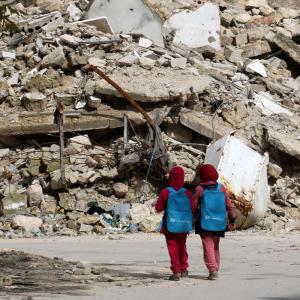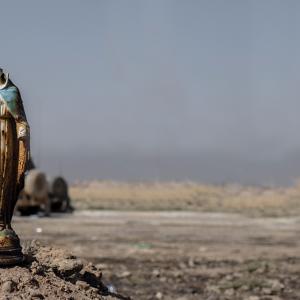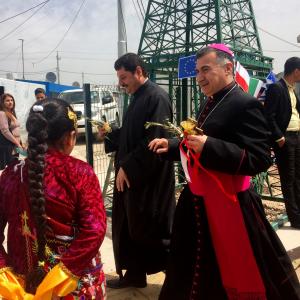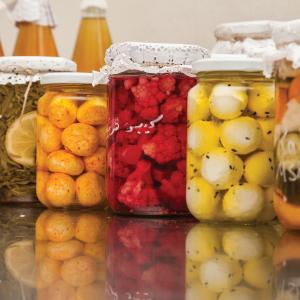
Anna Lekas Miller is an Istanbul-based journalist, covering Syria and the refugee crisis for the past four years. Follow her on Twitter @agoodcuppa.
Posts By This Author
After ISIS: Can Iraqi Christians Go Home Again?
DOZENS OF CHURCHGOERS are dressed in their Sunday best outside St. John’s Church in Qaraqosh, Iraq. Before entering, each person is individually searched. First, they are patted down for suicide vests. Then their bags are inspected for weapons.
It is Easter—the first to be celebrated in this church since Islamic State (ISIS) militants were driven out of Qaraqosh, formerly Iraq’s largest Christian-majority city, by Iraqi forces after nearly three years of conflict.
Everyone is cautious. A week earlier, ISIS suicide bombers killed more than 40 people, including themselves, at two churches in northern Egypt during Palm Sunday services.
Photo Essay: On Palm Sunday, Iraqi Christians March 80 Miles for Peace
To mark this particularly special Palm Sunday — the first since ISIS was defeated in the area — many assembled today will march 80 miles, from the camp to the village of Qarqosh, one of the largest traditionally Christian villages in Iraq. Some are originally from there, while others are marching in solidarity.
The march will stretch from the city of Erbil, to the Nineveh plain — across part of Iraqi-Kurdistan, and into Iraq, taking a total of at least five days.
Voices from Aleppo: 'God Willing, We Will Return'

Image via Jordi Bernabeu Farrús/Flickr
“This is one of the most difficult days in Aleppo’s history,” Ibrahim Abdul Laith told Sojourners over a series of WhatsApp voice notes. “We endured difficulties under the shelling, and under the siege, but even though the situation was difficult, we were fighting for our city.”
Later in the messages, his voice took on a somber tone.
“Now we are being asked to leave.”
Life Preservers
Lebanon has taken in more than a million refugees from Syria and Iraq. One group of women has cooked up a way to make them feel at home.
AFRAH ZOUHEIR FLEXES HER HAND as she purposefully stirs a pot of lemon juice, the fruity aroma filling the air as it rises to a boil.
“It needs to be hot in order to mix well with the sugars before it cools down and thickens,” she explains. “Then we bottle it and let it settle into a syrup.”
Zouheir has all of the looks of a professional chef. Her shoulder-length dark brown hair is tied back in a hairnet and her hands are coated in plastic gloves. She wears an apron over her sweatshirt, fanning the air, making sure that the lemon syrup drink she is making smells as it is supposed to; she appears undaunted about managing multiple pots simultaneously simmering over an open fire.
However, this is her first time working in a kitchen—at least professionally. In Mosul, Iraq, where she is from, she was a kindergarten teacher. But when the Islamic State invaded her home city in late 2013 and began targeting religious minorities, including Christians like Zouheir’s family, she grabbed her belongings and fled to Lebanon with her husband and four children. After a short stint in Beirut, the capital city, where rent is expensive and prejudice against refugees, among other factors, makes work hard to come by, she and her husband moved to Falougha, a mountain village where the air is fresh and, most important, the rent is cheap.
Wearing the White Hats
Syria Civil Defense workers - the "White Helmets" - haven't given up on the future of their country.

courtesy of thesyriacampaign.org
“IF THERE IS A SHELLING, stay away from the windows and crouch next to a sturdy piece of furniture—like a bed or a wardrobe.”
“In the case of a bombing, cover your head with your hands and scream for help.”
Although they read like lines from an emergency-preparedness instruction manual, these are actually from a children’s coloring book. The book follows Mahr, a little boy with big brown eyes and a bowl-shaped haircut, and “Bebo, the Puppy”—a slightly obese, striped orange dog—through a series of emergency situations, the kind that have been all too common in Syria.
“Just fold your hands over your head, like Mahr and Bebo, the Puppy.”
The book is illustrated, written, and distributed by Syria Civil Defense—a group of 2,600 volunteer rescue workers, renowned for saving civilians from explosions and barrel bombings in opposition-controlled Syria. The book is intended to instruct children, in a playful yet serious way, how to act during barrel bombings and shellings, which have become a part of daily life in Syria.
Mahr crouches next to a wardrobe during a shelling. After a barrel bombing, Bebo folds his paws over his floppy, cartoonish ears and screams for help. The wardrobe—another character in this Brave Little Toaster-like adaptation of a child’s perspective of the Syrian civil war—smiles down at both of them.
“Don’t worry—the civil defense is on its way.”
Although the Syrian revolution began as a nonviolent movement, inspired by the Arab uprisings in 2011, the Assad regime’s brutal and almost immediate crackdown on the demonstrations quickly escalated the protests into an armed revolt and, eventually, a civil war. Some protesters began to take up arms in self-defense, joined by defectors from the regime’s army, and later foreign fighters—forming what would become known as the Free Syrian Army (FSA), engaging in guerrilla-style military tactics to challenge the Assad regime.


